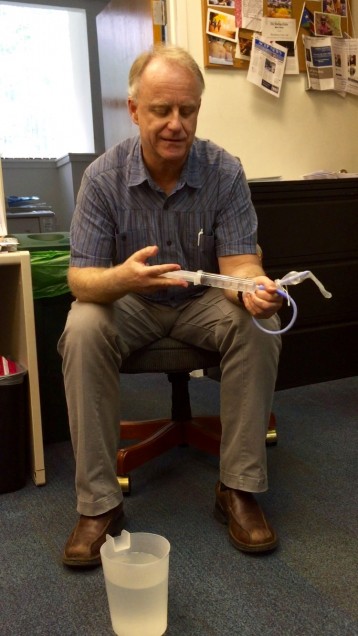Look, Listen, Learn: Dr. Onyango and Dr. Burke
This week we met with two professionals well-versed in the medical sphere of developing countries: Dr. Monica Onyango and Dr. Thomas Burke. Dr. Onyango has extensive experience studying and working in South Sudan, Angola, and her native country Kenya, . She is currently a Clinical Assistant Professor of Global Health at Boston University’s School of Public Health. She gave us insight into the delivery experience for women in East Africa as well as the major influencers on decisions regarding maternal health. She pointed out that many countries have high rates of antenatal care, but women still choose to deliver at home due to privacy and crowding concerns at hospitals. She noted that in largely patriarchal societies, the opinion of the mother-in-law is typically holds the most weight when a decision needs to be made on maternal and child care.

Dr. Thomas Burke demonstrates how to use his low-cost UBT
Dr. Onyango also emphasized the need to get perspectives from all levels of the health system, as a doctor in a high-level facility will likely express different needs than a midwife or patient in a rural clinic. Perhaps most importantly, Dr. Onyango suggested we start thinking of reproductive health versus maternal health, as many issues start with adolescent girls.
Dr. Thomas Burke heads the Massachusetts General Hospital Division of Global Health and Human Rights, a group whose aim is to improve the quality of life of those in underserved countries, with a focus on women and children. Dr. Burke has a lot of experience working with maternal health and the Uterine Balloon Tamponade, a device used to offset the effects of postpartum hemorrhage until the mother can be transferred to a high-level health facility. Not only has he done incredible work on the UBT, but he has done a great job adapting the device to be implemented in sub-Saharan Africa. He considers the culture and resources of the areas he works in to make sure the device will be accepted, used, and effective. In the kit he puts together with the UBT are pictorial instructions of how to operate the device, which is considerate of the highly illiterate population who may be using it. Dr. Burke said local ownership and partnering with existing organizations on the ground are key to successful, sustainable device implementation. You can read more about his device here.
Both Dr. Onyango and Dr. Burke stressed the importance of going into the project with an open mind, innovating around the daily lives of the local community, and low-tech devices that can be used in multiple settings, especially the most peripheral parts of the health system.


